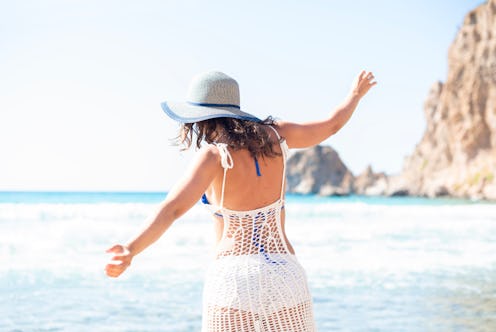Style
Experts Explain How To Treat 3 Different Kinds Of Sweat

Even though it's a totally normal bodily function, sweating can be kind of a nuisance. But there's actually more than just one type of sweat. And different types of sweat affect your body in different ways. Yep, depending on whether you worked up a sweat from some exercise, are really stressing about an upcoming project, or it's just hot outside, you may have different bodily reactions. (And yes, a certain type of sweat tends to smell worse than the others.) So to find out some more about how these three causes of sweat differ and how you should treat each kind, I emailed with Dr. Marnie Nussbaum, NYC-based cosmetic dermatologist, and Tara Pelletier, co-founder of Meow Meow Tweet.
Of course, it's good to keep in mind that we sweat to benefit our bodies. Dr. Nussbaum reminds that sweat functions to "regulate our temperature and excrete toxins as well as bacteria." However, if not properly managed, sweat can also cause some unwanted skin concerns. So you can keep breakouts and odor under control (and if you've ever wondered what that rash is that creeps up sometimes when you sweat), here's how three different types of sweat can affect your body, and how to treat them:
1. Exercise
Exercise-induced sweat is probably the most obvious kind because, well, you're working for it. But according to Dr. Nussbaum, this type of sweat "creates the perfect environment inside your pores for acne-causing bacteria like P. acnes to proliferate." And especially if you work out in non-breathable clothing, that bacteria can become clogged in your pores, leading to acne on your face, chest, and/or back. So to help keep sweat-related breakouts at bay, Dr. Nussbaum recommends always wearing breathable fabrics and not lingering in sweaty clothes— shower immediately after after you finish working out.
2. Heat
Do you ever get little itchy bumps on your skin when you sweat? According to Dr. Nussbaum, that's heat rash or miliaria, and it "can develop at any age and is the result of the sweat ducts clogging." The type of rash you experience will depend on where within the duct your sweat gets trapped. Dr. Nussbaum explains, "miliaria crystallina is when you see tiny, clear blisters representing sweat that has gotten trapped in the superficial layer of skin." Another type of miliaria, she says, is "prickly heat or miliaria rubra [which] results in red bumps that are caused by deeper blockages causing redness, inflammation, and itch."
While it can be annoying to deal with, miliaria will subside when your skin cools and is no longer exposed to the heat source (whether it's being outside or even in a hot shower). And don't worry, just because you've had it or developed it doesn't mean it can't go away. The only concern with miliaria, says Dr. Nussbaum, is if your rash worsens. This could be a sign of infection, so if you notice your bumps look worse than usual or persist after your skin has cooled, it's important to see your doctor.
3. Stress
While exercise and heat-based sweat is released from eccrine glands and is made of 99-percent water, anxiety and stress-based sweat is produced from apocrine glands and is composed of 80-percent water and 20-percent lipids and proteins, says Dr. Nussbaum. And those lipids and proteins act as food for bacteria which is what causes more body odor than exercise or heat-based sweat. However, Pelletier adds that body odor is also affected by other factors such as diet, hormones, genetics, lifestyle, and wardrobe, so what is effective for one person's sweat may not be the best option for another person.
One option, says Dr. Nussbaum, is to look for "an antiperspirant with aluminum salts which physically block the sweat glands." If you prefer natural deodorant though, Pelletier recommends looking for a baking soda or magnesium-based one. These ingredients, she says, create "an environment where bacteria won't thrive, resulting in a decrease in the unpleasant odor."
Whatever you choose though, using the right deodorant or antiperspirant, keeping your skin relatively cool, and showering immediately after exercising will help ensure your skin stays healthy and smelling nice in the face of sweat.
Images: Getty Images (4)